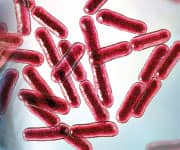Life Extension Magazine®
After-meal bloating is one of the most common and difficult digestive issues.
Up to 30% of people experience bloating. It tends to come hand-in-hand with other gastrointestinal disorders, such as dyspepsia (indigestion), irritable bowel syndrome, and constipation.1
Research has identified four plant compounds that help relieve bloating and other gastrointestinal problems.
In a clinical trial, 63.1% of subjects taking an artichoke-ginger blend had significantly reduced feelings of bloating, gassiness, nausea, and other symptoms of indigestion.2
In another trial, a fennel-curcumin combination relieved symptoms of irritable bowel syndrome, including bloating and stomach pain, by more than 50%. This fennel-curcumin blend prevented all symptoms in 25.9% of users.3
Taken together, these four plant compounds can provide partial or complete relief from digestive miseries.
What Causes Bloating?

Bloating is characterized by trapped gas, abdominal pressure and pain, and a feeling of excessive fullness. It is one of the most frequently reported gastrointestinal issues.1
The causes are complex. There can be a wide range of contributing factors, notably including food intolerance, small intestinal bacterial overgrowth, and inflammatory conditions.1
But research has revealed that four plant compounds can safely relieve bloating and improve the overall health of your digestive system.
Fennel-Curcumin Relieves Pain and Gas
Fennel and curcumin have traditionally been used to aid digestion.
Seeds from fennel, a plant known for its licorice flavor, have long been consumed after meals to promote digestion and prevent flatulence.4
In vitro research shows that fennel reduces gas production by inhibiting the activity of a methane-producing bacterial enzyme.5
In addition, clinical trials have shown that fennel seeds, tea, and seed oil stimulate gastrointestinal function, improving gastric motility.3,6,7
Fennel also has an antispasmodic effect, reducing irregular muscle contractions that impair normal gut motility.3
Researchers combined fennel seed oil and a low-dose curcumin in a clinical trial to test their effect on bloating and abdominal pain.3
Easing Irritable Bowel Syndrome
For the trial, researchers enlisted 121 patients between the age of 18-60 who suffered from irritable bowel syndrome. They gave them either a blend of 42 mg of curcumin and 25 mg of fennel seed oil or a placebo, twice daily.3
After 30 days, those taking the fennel-curcumin blend reported an average 50% decrease in bloating, abdominal pain, and other irritable bowel syndrome symptoms. This was nearly double the 26.1% decrease in the placebo group.
All symptoms were improved by treatment. Among those taking fennel-curcumin, 25.9% became completely symptom-free, compared to just 6.8% of placebo recipients.
The treated group also reported a significant improvement in irritable bowel syndrome-related quality of life, with no adverse effects.
Artichoke-Ginger Mix Aids Digestion
Artichoke influences the production of bile from the liver, which helps break down fats, absorb fat-soluble vitamins, and speed up digestion.8 Italians traditionally serve an artichoke and herbal liqueur after dinner to assist with digestion.
Ginger has been shown in human studies to promote gastric motility, the movement of food out of the stomach and into the small intestine.9,10
A combination of 20 mg of ginger root extract and 100 mg of artichoke leaf extract led to substantial gastrointestinal improvement in a clinical trial.2
The study recruited 126 patients with functional dyspepsia (recurring and unexplained indigestion) to receive the combination or a placebo.
Patients rated the severity of six dyspepsia symptoms: fullness, bloating, feeling full after only a small amount of food, nausea, vomiting, and epigastric (upper abdominal) pain.
In just two weeks, 44.6% of participants taking the artichoke-ginger blend had significant improvement in digestive symptoms, compared to 13.1% of placebo users.
After four weeks, 63.1% of those in the treatment group reported marked reductions in digestive symptoms, compared to only 24.6% in the placebo group.
What you need to know
Relief for Post-Meal Problems

- Bloating is one of the most common gastrointestinal symptoms, marked by a feeling of excessive fullness, gas, and abdominal pressure and pain.
- Scientists have identified four clinically effective compounds that target the underlying causes of bloating.
- A blend of artichoke leaf and ginger root extracts relieves symptoms of dyspepsia (indigestion), including bloating, nausea, vomiting, and upper abdominal pain.
- A mix of fennel seed oil and curcumin decreases bloating, abdominal pain, and other severe symptoms of irritable bowel syndrome.
- Taken together, ginger root, artichoke leaf, fennel seed oil, and curcumin may help prevent or significantly reduce gastrointestinal distress and improve quality of life.
Summary

After-meal bloating, and other gastrointestinal disturbances can impair our quality of life.
Researchers have identified four plant compounds that target multiple causes of bloating and have shown clinical effectiveness.
In one clinical trial, 63.1% of subjects taking an artichoke-ginger blend experienced significantly reduced gastrointestinal disturbances.
In another trial, a combination of fennel and curcumin was able to completely prevent all gastrointestinal symptoms in 25.9% of users.
Together, compounds from these four plants may promote a healthier digestive system and help protect against bloating, gas, nausea, and other gastrointestinal issues.
If you have any questions on the scientific content of this article, please call a Life Extension® Wellness Specialist at 1-866-864-3027.
References
- Lacy BE, Cangemi D, Vazquez-Roque M. Management of Chronic Abdominal Distension and Bloating. Clin Gastroenterol Hepatol. 2021 Feb;19(2):219-31 e1.
- Giacosa A, Guido D, Grassi M, et al. The Effect of Ginger (Zingiber officinalis) and Artichoke (Cynara cardunculus) Extract Supplementation on Functional Dyspepsia: A Randomised, Double-Blind, and Placebo-Controlled Clinical Trial. Evid Based Complement Alternat Med. 2015;2015:915087.
- Portincasa P, Bonfrate L, Scribano ML, et al. Curcumin and Fennel Essential Oil Improve Symptoms and Quality of Life in Patients with Irritable Bowel Syndrome. J Gastrointestin Liver Dis. 2016 Jun;25(2):151-7.
- Rather MA, Dar BA, Sofi SN, et al. Foeniculum vulgare: A comprehensive review of its traditional use, phytochemistry, pharmacology, and safety. Arabian Journal of Chemistry. 2016 2016/11/01/;9:S1574-S83.
- Patra AK, Kamra DN, Agarwal N. Effects of extracts of spices on rumen methanogenesis, enzyme activities and fermentation of feeds in vitro. J Sci Food Agric. 2010 Feb;90(3):511-20.
- Alexandrovich I, Rakovitskaya O, Kolmo E, et al. The effect of fennel (Foeniculum Vulgare) seed oil emulsion in infantile colic: a randomized, placebo-controlled study. Altern Ther Health Med. 2003 Jul-Aug;9(4):58-61.
- Ma HW, Zhao JT, Zhao X. The Effect of Fennel Tea Drinking on Postoperative Gut Recovery after Gynecological Malignancies Operation. Sichuan Da Xue Xue Bao Yi Xue Ban. 2015 Nov;46(6): 940-3.
- Ben Salem M, Affes H, Ksouda K, et al. Pharmacological Studies of Artichoke Leaf Extract and Their Health Benefits. Plant Foods Hum Nutr. 2015 Dec;70(4):441-53.
- Hu ML, Rayner CK, Wu KL, et al. Effect of ginger on gastric motility and symptoms of functional dyspepsia. World J Gastroenterol. 2011 Jan 7;17(1):105-10.
- Micklefield GH, Redeker Y, Meister V, et al. Effects of ginger on gastroduodenal motility. Int J Clin Pharmacol Ther. 1999 Jul;37(7):341-6.

